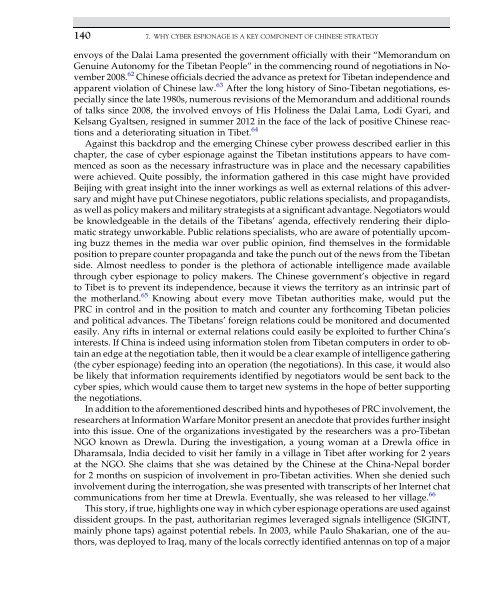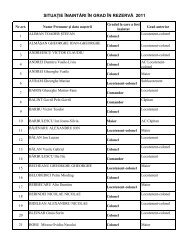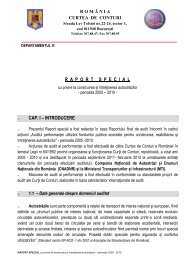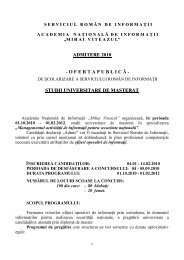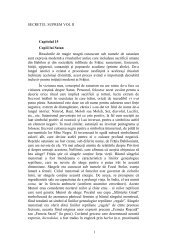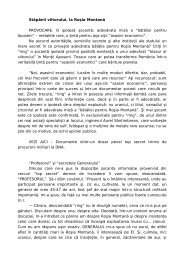Introduction to Cyber-Warfare - Proiect SEMPER FIDELIS
Introduction to Cyber-Warfare - Proiect SEMPER FIDELIS
Introduction to Cyber-Warfare - Proiect SEMPER FIDELIS
Create successful ePaper yourself
Turn your PDF publications into a flip-book with our unique Google optimized e-Paper software.
140 7. WHY CYBER ESPIONAGE IS A KEY COMPONENT OF CHINESE STRATEGYenvoys of the Dalai Lama presented the government officially with their “Memorandum onGenuine Au<strong>to</strong>nomy for the Tibetan People” in the commencing round of negotiations in November2008. 62 Chinese officials decried the advance as pretext for Tibetan independence andapparent violation of Chinese law. 63 After the long his<strong>to</strong>ry of Sino-Tibetan negotiations, especiallysince the late 1980s, numerous revisions of the Memorandum and additional roundsof talks since 2008, the involved envoys of His Holiness the Dalai Lama, Lodi Gyari, andKelsang Gyaltsen, resigned in summer 2012 in the face of the lack of positive Chinese reactionsand a deteriorating situation in Tibet. 64Against this backdrop and the emerging Chinese cyber prowess described earlier in thischapter, the case of cyber espionage against the Tibetan institutions appears <strong>to</strong> have commencedas soon as the necessary infrastructure was in place and the necessary capabilitieswere achieved. Quite possibly, the information gathered in this case might have providedBeijing with great insight in<strong>to</strong> the inner workings as well as external relations of this adversaryand might have put Chinese negotia<strong>to</strong>rs, public relations specialists, and propagandists,as well as policy makers and military strategists at a significant advantage. Negotia<strong>to</strong>rs wouldbe knowledgeable in the details of the Tibetans’ agenda, effectively rendering their diplomaticstrategy unworkable. Public relations specialists, who are aware of potentially upcomingbuzz themes in the media war over public opinion, find themselves in the formidableposition <strong>to</strong> prepare counter propaganda and take the punch out of the news from the Tibetanside. Almost needless <strong>to</strong> ponder is the plethora of actionable intelligence made availablethrough cyber espionage <strong>to</strong> policy makers. The Chinese government’s objective in regard<strong>to</strong> Tibet is <strong>to</strong> prevent its independence, because it views the terri<strong>to</strong>ry as an intrinsic part ofthe motherland. 65 Knowing about every move Tibetan authorities make, would put thePRC in control and in the position <strong>to</strong> match and counter any forthcoming Tibetan policiesand political advances. The Tibetans’ foreign relations could be moni<strong>to</strong>red and documentedeasily. Any rifts in internal or external relations could easily be exploited <strong>to</strong> further China’sinterests. If China is indeed using information s<strong>to</strong>len from Tibetan computers in order <strong>to</strong> obtainan edge at the negotiation table, then it would be a clear example of intelligence gathering(the cyber espionage) feeding in<strong>to</strong> an operation (the negotiations). In this case, it would alsobe likely that information requirements identified by negotia<strong>to</strong>rs would be sent back <strong>to</strong> thecyber spies, which would cause them <strong>to</strong> target new systems in the hope of better supportingthe negotiations.In addition <strong>to</strong> the aforementioned described hints and hypotheses of PRC involvement, theresearchers at Information <strong>Warfare</strong> Moni<strong>to</strong>r present an anecdote that provides further insightin<strong>to</strong> this issue. One of the organizations investigated by the researchers was a pro-TibetanNGO known as Drewla. During the investigation, a young woman at a Drewla office inDharamsala, India decided <strong>to</strong> visit her family in a village in Tibet after working for 2 yearsat the NGO. She claims that she was detained by the Chinese at the China-Nepal borderfor 2 months on suspicion of involvement in pro-Tibetan activities. When she denied suchinvolvement during the interrogation, she was presented with transcripts of her Internet chatcommunications from her time at Drewla. Eventually, she was released <strong>to</strong> her village. 66This s<strong>to</strong>ry, if true, highlights one way in which cyber espionage operations are used againstdissident groups. In the past, authoritarian regimes leveraged signals intelligence (SIGINT,mainly phone taps) against potential rebels. In 2003, while Paulo Shakarian, one of the authors,was deployed <strong>to</strong> Iraq, many of the locals correctly identified antennas on <strong>to</strong>p of a major


